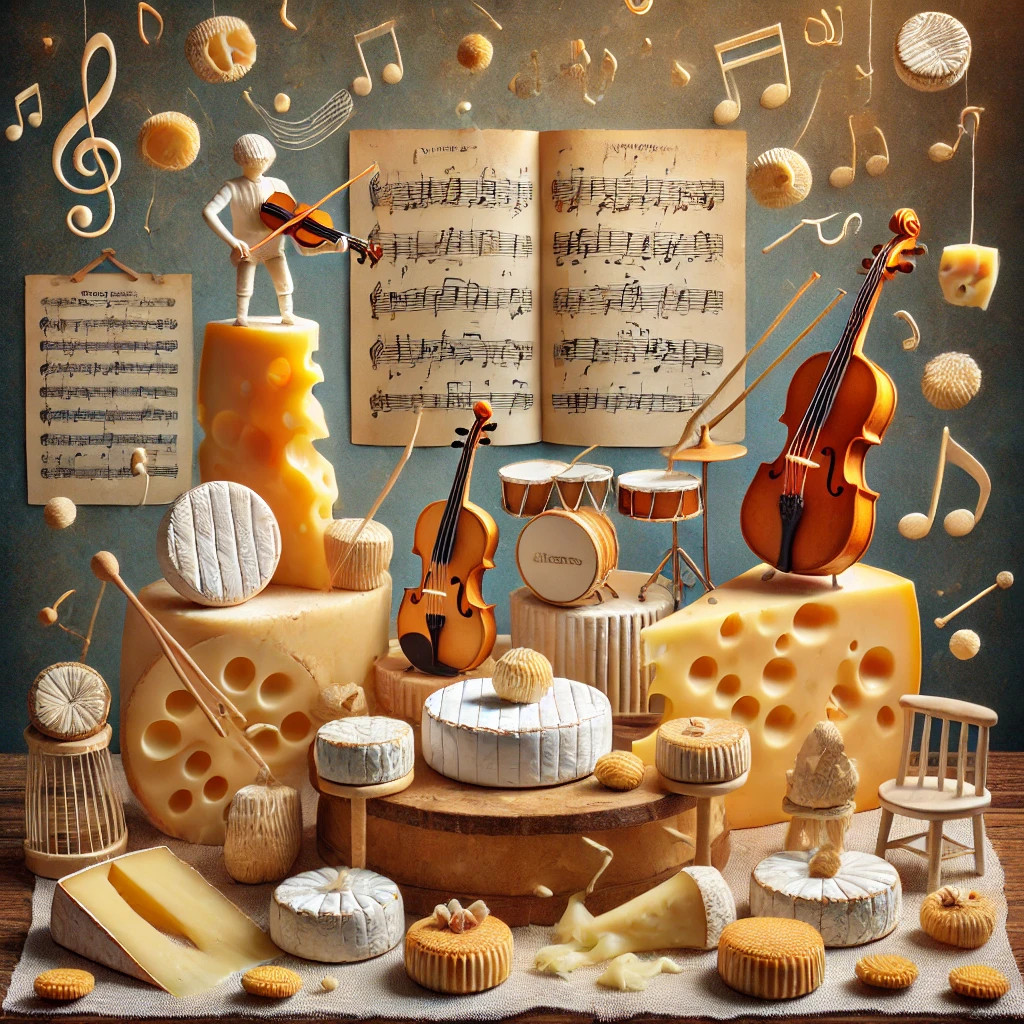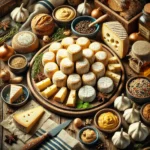Cheese and music may seem like worlds apart—one rooted in dairy craftsmanship and microbiology, the other in rhythm, melody, and human emotion. Yet across cultures and centuries, these two sensory arts have intersected in delicious and unexpected ways. From Swiss experiments that age cheese with hip-hop to French affineurs who pair cheese with classical music, the relationship between sound and flavour is becoming a modern culinary fascination.
Whether you are a cheese lover, audiophile, or experimental foodie, exploring how cheese and music align opens a window into how humans taste, feel, and connect.
🎻 Music Meets Cheese: A Cultural Overview
Many food traditions are intertwined with musical rituals:
-
Italian wine-and-cheese gatherings often include folk guitar.
-
French caves d’affinage play soft classical or ambient noise to influence aging bacteria.
-
American craft cheese bars curate jazz playlists to elevate tasting notes.
-
Spanish tapas bars balance Manchego with flamenco background rhythms.
Music influences mood, and mood influences tasting perception. This is where the pairing becomes more than artistic—it becomes neurological.
🎧 The Science Behind Cheese & Sound
Researchers have begun testing how soundwaves influence cheese ageing and flavour development.
🧪 Swiss Aging Experiment – Hip-Hop vs. Classical
In 2019, a Swiss cheesemaker and scientists exposed wheels of Emmental to:
-
Mozart
-
Led Zeppelin
-
A Tribe Called Quest (hip-hop)
-
Ambient electronic tones
🧀 Results
Hip-hop–aged cheese showed:
-
stronger aroma
-
deeper umami notes
-
richer texture
Why? Bacteria respond to vibrational frequencies. The sound waves stimulate fermentation, affecting moisture retention and microbial distribution.
This opened a field now called “sonic aging.”
🎼 Cheese Tasting with Music: How Sound Changes Taste
Chefs and sensory experts have found that music can alter:
| Sensory Category | Musical Influence |
|---|---|
| Saltiness | Enhanced by bass-driven music |
| Sweetness | Lifted by soft, melodic classical |
| Bitterness | Reduced with jazz or bossa nova |
| Umami depth | Heightened by hip-hop and rhythmic world beats |
Music doesn’t change cheese chemically (unless in sonic-aging chambers), but it changes the eater’s emotional receptors, altering taste interpretation.
🧀 Best Cheese & Music Pairings
1. Brie + French Jazz
Soft, creamy, romantic textures mirror accordion and café jazz.
2. Aged Cheddar + Rock Classics
Cheddar’s bold salt works perfectly with guitar grit and percussion.
3. Blue Cheese + Ambient Electronic
Blue cheese complexity benefits from slow, atmospheric soundscapes.
4. Goat Cheese + Folk Acoustic
Fresh, pastoral, countryside vibrations.
5. Swiss Alpine Cheese + Classical Symphony
Orchestral depth reflects mountain cave nuance.
🌍 Global Traditions Where Cheese & Music Meet
🇫🇷 France – Cheese & Opera Tastings
Luxury fromageries in Paris host guided tastings with:
-
opera arias
-
string quartets
-
chanson ballads
🇮🇹 Italy – Pecorino & Mandolin Nights
Tuscan vineyards host long-table dinners combining:
-
pecorino
-
Chianti
-
live mandolin folk sets
🇺🇸 USA – Craft Beer, Bluegrass & Cheddar
In Vermont and Wisconsin, artisanal dairies pair farm cheddar with:
-
bluegrass bands
-
barn dances
-
beer tasting flights
🇪🇸 Spain – Flamenco & Manchego
Tapas bars play flamenco guitar to highlight:
-
Manchego’s nutty depth
-
Iberian ham richness
Musical pairing isn’t novel—it’s cultural memory.
🎤 Modern Cheese + Music Experiences
Cheese Bars & Sonic Playlists
Urban cheese lounges curate playlists based on:
-
country of cheese origin
-
rind style
-
milk type
-
aroma strength
A creamy truffle brie calls for warm jazz, while aged gouda pairs beautifully with brass undertones.
DJ-Hosted Cheese Nights
In New York, Berlin, and Copenhagen, DJs host “cheese listening parties” where tasting flights are matched with curated vinyl.
Sonic-Aged Cheese Festivals
Switzerland and France have begun showcasing cheeses aged in chambers with genre-specific music.
🍷 Wine, Cheese & Music: The Golden Trio
A tasting menu becomes an immersive sensory ritual when wine and music join cheese.
Example Trio
| Cheese | Wine | Music |
|---|---|---|
| Brie de Meaux | Champagne | Classic Piano |
| Roquefort | Sauternes | Ambient Chill |
| Gruyère AOP | Pinot Noir | Baroque Strings |
| Manchego | Rioja | Flamenco Guitar |
Music does not compete—it enhances.
💡 Hosting Your Own Cheese & Music Pairing Night
Step 1: Select 4–5 Cheeses
Range by:
-
texture
-
age
-
milk type
Step 2: Match Genres
-
Creamy: jazz
-
Funky rind: funky bass
-
Sharp cheddar: classic rock
Step 3: Serve with Light Notes
-
nuts
-
olives
-
local breads
-
honey
-
fig jam
Step 4: Dim lights & curate mood
Taste enhances when attention narrows.
⭐ Final Summary
Cheese and music share more than sensory pleasure—they share story, mood, science, and tradition. From hip-hop-aged Swiss wheels to French classical tasting rooms, the partnership represents a deep truth:
Taste is never just taste; it is environment, emotion, rhythm, and memory.
Cheese carries the terroir of land; music carries the tone of the heart. Together, they form one of the most engaging gastronomic experiences of our time.
FAQs — Cheese & Music
1. Does music really affect how cheese tastes?
Yes—mood-based perception shifts flavour interpretation, and sonic aging affects microbial activity.
2. Which cheese works best with classical music?
Alpine cheeses like Gruyère, Comté, and Emmental.
3. What is sonic cheese aging?
Exposing cheese to music vibrations during ripening to change aroma and taste.
4. Can I host a cheese & music tasting at home?
Absolutely—pair mild cheeses with gentle jazz, bold cheeses with rock or funk.
5. Does volume matter?
Yes—moderate volume enhances perception; overly loud music distracts taste focus.



